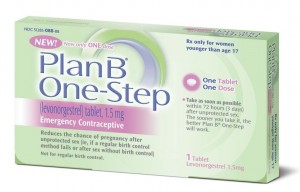 New York City schools distributed 12,721 doses of the “Morning-After Pill” to students last year, according to documents obtained through a Freedom of Information Act request. The 40 school-based “health centers” also performed thousands of injections of long-term contraception and implanted intrauterine devices (IUDs).
New York City schools distributed 12,721 doses of the “Morning-After Pill” to students last year, according to documents obtained through a Freedom of Information Act request. The 40 school-based “health centers” also performed thousands of injections of long-term contraception and implanted intrauterine devices (IUDs).
Under state law, schools do not need to obtain parental consent to dispense the drugs. The $2.7 million program has provided contraceptives to 22,400 teens as young as 14.
Last September, the district announced that the city Department of Health had distributed Plan B to 567 teenage girls, and another 580 received Reclipsen birth control. But the New York Post, which filed the FOIA request, discovered the program went far beyond what officials had previously admitted.
In new documents the district reveals it distributed 10,720 doses of “Plan B” in the 2010-11 school year, and 5,039 in 2009-10, the program’s launch year.
The schools administered another 2,117 shots of the long-acting contraceptive Depo-Provera. Students also received hormone injections, or were implanted with the Nuva Ring or IUDs, in addition to receiving 10,462 packets of birth control.
The clinics – located in largely poor areas of the city – have parents and religious leaders up in arms.
“This was population control on blacks and Latinos without our knowledge,” said NYC Parents Union President Mona Davids, who is black.
Both Plan B and the IUD block fertilization, but may also work to prevent a newly conceived child from implanting in the uterine walls, resulting in a chemical abortion.
“What gives the mayor the right to decide, without adequate notice, to give our children drugs that will impact their bodies and their psyches?” Davids asked.
The powerful contraceptive and abortifacient drugs have been found to have a variety of negative side effects. For instance, Reclipsen’s side effects include depression, liver cancer, sudden blindness, heart attack, stroke, and hepatitis, while Arizona State University researchers have linked Depo-Provera to memory loss. The pill has been found to increase risk of blood clot.
Cardinal Timothy Dolan and Bishop Nicholas DiMarzio of Brooklyn had called the New York City schools’ policy “tragic and misguided” in a blog post in September.
“Studies show that increased availability of contraception fails to reduce rates of unintended pregnancy and abortion,” they noted.
A study published in December by a University of North Carolina professor found that widespread use of “emergency contraception” had no effect on pregnancy or abortion rates but “led to a statistically significant increase in STD rates.”
Despite the risks and evidence that dispensing contraceptives is not effective, some organizations continue to hold out contraception as a panacea for teenage sexual issues.
The American Academy of Pediatrics (AAP) issued a policy statement in November asking doctors, including school nurses, to promote the use of “emergency contraception” among sexually active teens.
Stating that “abstinence before marriage is the only sure way to avoid pregnancy and disease,” Cardinal Dolan and Bishop DiMarzio concluded, “The public schools would be better advised to promote what truly works rather than continuing to follow a failed experiment that will only lead to further problems for society and for young people.”



